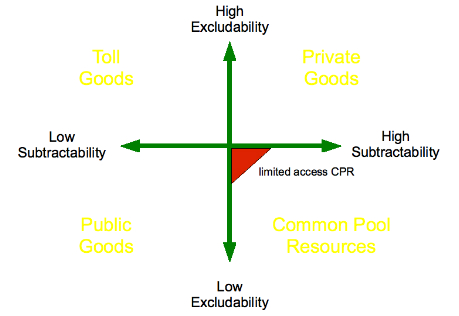
Pacific Coast Environmental Metrics
"Specializing in measuring intangibles."
 Pacific Coast Environmental Metrics "Specializing in measuring intangibles." |
|
Zero Waste Planet Services Our Mission Social Games Common Pool Resources Collective Action Publications/Working Papers Clients Frequently Asked Questions About Us Quotes Top Level PCEM Box 63 Malahat, B.C. V0R 2L0 (250) 730-3738 metrics [at] pcem.ca |
Oct. 12, 2009 - Dr. Elinor Ostrom wins Nobel Prize in Economics for her work on collective action management of common pool resources.It is a false dichotomy to say there are only public and private goods. There are two other types of goods, toll goods and common pool resources. As noted by Dr. Vincent Ostrom, goods can be cataloged by two attributes: excludability and subtractability. Economists refer to subtractability as "rivalness." Essentially the concept refers to how much of the good is left after consumption. Your initial thought might be that none of the good is left over, which is true for private goods like what you would buy on a supermarket shelf, but not true for other goods, like public transportation. After you have arrived at your destination and left the bus, the seat remains and someone else can use it. There is some "subtractability," in that while you are occupying the seat there is one less seat available, but overall public goods are noted for their near-zero subtractability and private goods are noted for their almost-complete subtractability.The other attribute, excludability, refers to both the cost to exclude consumers and the cost of excluding consumers. It is possible to enclose a water source inside a fence, for a nominal amount, but if that water source is the only source for drinking water, that exclusion results in death. Because water is subtractable, and the cost of excluding consumers is high, water is a common pool resource. Common pool resources have unique characteristics, and one such characteristic is that the outcomes of utilization are collective, not individual. Everyone that utilizes a common pool resources is inherently dependent on everyone else that has access to that common pool resource. If you think about it for a moment, you'll realize that the air we breathe is a common pool resource. A lot of literature has been spent talking about the "Tragedy of the Commons," where individuals will maximize their own returns rather than work towards collective outcomes. It is unfortunate that so much effort has been expended on a premise that simply isn't true. Read Garrett Hardin's article all the way through, and ask yourself what does he mean "Freedom to breed is intolerable?" Garrett Hardin's "Tragedy of the Commons" is the projections of a deeply flawed individual. There is a substantial body of literature that shows people can come together and work towards maximizing the collective outcomes, even if it means reducing individual payoffs. Furthermore, properly designed collective action systems have successfully managed common pool resources for hundreds of years in some cases. The real tragedy is that very few people seem willing to challenge the beliefs and cultures that assume selfish behavior is the only possible outcome. For those interested in an example of a toll good, consider a local amusement park. It is fenced (high excludability, as fence is not expensive and people can live without rollercoaster rides) but the amusement rides are still there after you have left (low subtractability). |
 Adapted from Understanding Institutional Diversity by Elinor Ostrom |
 |
||